牛津上海版八年级上英语Unit1-3基础知识点练习
Unit 1 知识点整理及练习Grammar 知识点整理及练习(含答案) 牛津译林版八年级上册
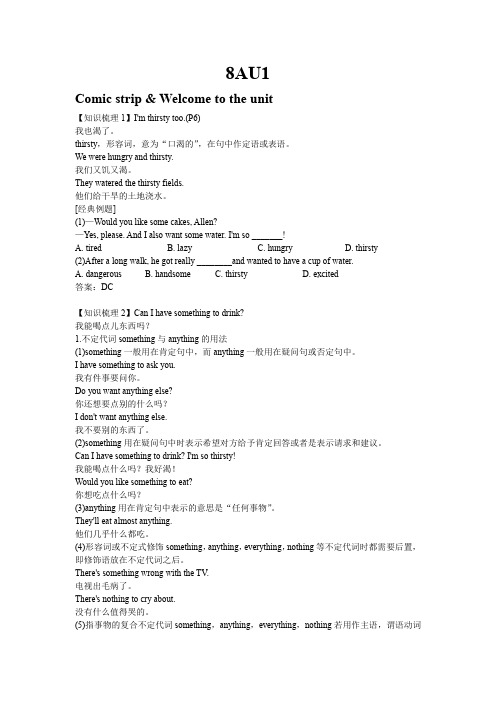
8AU1Comic strip & Welcome to the unit【知识梳理1】I'm thirsty too.(P6)我也渴了。
thirsty,形容词,意为“口渴的”,在句中作定语或表语。
We were hungry and thirsty.我们又饥又渴。
They watered the thirsty fields.他们给干旱的土地浇水。
[经典例题](1)—Would you like some cakes, Allen?—Yes, please. And I also want some water. I'm so _______!A. tiredB. lazyC. hungryD. thirsty(2)After a long walk, he got really ________and wanted to have a cup of water.A. dangerousB. handsomeC. thirstyD. excited答案:DC【知识梳理2】Can I have something to drink?我能喝点儿东西吗?1.不定代词something与anything的用法(1)something一般用在肯定句中,而anything一般用在疑问句或否定句中。
I have something to ask you.我有件事要问你。
Do you want anything else?你还想要点别的什么吗?I don't want anything else.我不要别的东西了。
(2)something用在疑问句中时表示希望对方给予肯定回答或者是表示请求和建议。
Can I have something to drink? I'm so thirsty!我能喝点什么吗?我好渴!Would you like something to eat?你想吃点什么吗?(3)anything用在肯定句中表示的意思是“任何事物”。
牛津上海8年级上册Unit1-Unit2重要知识点及语法点复习

U1-U2Unit1 重要知识点复习词汇1会计______________2志向______________3棒球运动______________4最好的______________5大学;学院______________6角______________7梦想______________8在……期间______________9随函(或包裹)附上______________ 10高度______________11喜爱,有兴趣______________12或许;可能______________13米;公尺______________14在附近______________15拥有______________16物理学______________17很可能;大概______________18屋顶______________19滑雪______________20乒乓球运动______________21领带______________22标题;题目______________23(综合性)大学______________【语块归纳】1.own v.拥有n.独自on one’s own= by oneselfadj.自己的I have my own car.2.German n.德国人;德语Germany n.德国【注意】国籍和国人,国人变复数口诀:中日不变英法变,其余都要加s。
Chinese, Japanese, British man, French man, Canadian(s)3.maybe= possibly= probably adv.可能地【拓展】maybe和may be的区分:Maybe为副词,一般放在句首Maybe you are right.May be为情态动词+动词原形You may be right.4.near adj./ prep.附近的【反义词】far adj.远的be far away from 距离……远的【辨析】nearly adv.几乎nearby adj.附近的(一般作后置定语)There is a shop nearby.语法(一)不定冠词a.an的用法不定冠词a.an均可表示“一”、“一个”,一般用于以下几种情况中:1. 用于可数名词的单数形式前,指人或事物的某一种类。
牛津上海8年级上册Unit1-Unit2重要知识点及语法课后练习

I. Read and choose the best answer.(选择最恰当的答案)( ) 1. Ben studied the menu for _________ while and then ordered his meal.A.aB. anC. theD. /( ) 2. The two girls want to be_when they grow up.A.women policeB. woman policesC. policewomenD. policewoman( ) 3. Everyone must be responsible_what he has done and said.A. toB. forC. inD. at( ) 4. You have got so many books. Could you lend me _________ to read?A. someB. anyC. somethingD. anything ( ) 5. It's time to go to school.your school uniform and don’t be late.A. WearB. Put onC. DressD. Dress up ( ) 6. The teacher noticed the naughty boy in class.A. sleepedB. sleepsC. sleepingD. slept ( )7. The theft took place at the famous Pizza Palace .A. a week agoB. next weekC. in a weekD. for a week ( )8. How forgetful I am! I’ve my English homework at home again.A. forgotB. forgetC. leaveD. left ( ) 9. Computers can work out problems than human beings.A. quicklyB. much more quicklyC. the most quicklyD. even quicker( ) 10. people are sitting quietly in the hall and listening to the speech.A. Six hundred ofB. Six hundredsC. Six hundredD. Six hundreds ofⅡ. Fill in the blanks with the words in their proper forms.(用括号中所给的单词的适当形式填空)1.Our girls have_________(achievement) their goal in music competition—the first prize forgroup singing.2.The painter got 1,200 yuan from the ________(sell ) of his oil painting.3.Miss. Lin is __________(response) for our class. She is our class teacher.4.Every morning we__________ some business problems over breakfast.(discussion)5.Who was the first________ (come) this evening.6.John, ___________(not make) any noise, your father__________(sleep).7.The child often_________(watch) TV in the evening.8.________ Mike _________(read ) English every day?9.We often________(play) in the playground.10.She and I ____________ (take) a walk together every evening.Ⅱ. Rewrite the sentences as required. (按要求改写句子)1.Andrew doesn’t watch TV until 6:30 p.m. every day.(改为肯定句)Andrew ___________ TV _______ 6:30 p.m. every day.2.Wendy is too young to drive.(保持原句意思不变)Wendy is not ________ _________ to drive.3.My mother usually attends Japanese classes every evening.(保持原句意思不变)My mother usually Japanese classes every evening.4.Oh, the banknote(纸币) is one thousand dollar.(保持原句意思不变)Oh, this is ______________ ______________ banknote.5.She must be an actress.(改为否定句)She__________ ___________ an actress.A. Choose the words and expressions and complete the passage.On a recent flight, Laura was talking happily with the woman in the next seat— until the conversation turned to fares. The woman, who bought her ticket two months in advance, paid $109. Laura paid the 1 fare of $457. She decided that next time she would find out how to travel for less.Here are some ways to travel for less:Cheap airline tickets. To fly for less money, you can buy non-refundable(不能退票的) plane tickets two or three months before your trip.The cheapest way to fly is as a courier (信使). 2 for delivering a package for a courier company, you get a plane ticket that costs as little as one-quarter of the regular fare – or even less if the company needs someone at the 3 minute. Recently, a courier flew round trip from Los Angeles to Tokyo for $100; a regular ticket cost around $1,800.Train passes. If you’re going to do a lot of traveling by train, a train pass will 4 you money. Buying a single pass gives you unlimited travel for a period of time. Train passes can be especially 5 in India, which has the world’s largest railway system; in Japan, where trains are fast and convenient; and in Europe, where trains go to over 30,000 cities.Hostels(招待所). Hostels used to provide cheap rooms for people under the age of 25. Nowadays, hostels don’t have any age requirements. They’re not only cheap ($8--$17 a night) but a great way to 6 people. Hostels are often in interesting places – a castle in Germany, a lighthouse in California, a one-room schoolhouse in the wild area of Australia. And sometimes hostels even have large swimming pools.1.A) less B) cheap C) only D) full2.A) In return B) In addition C) At least D) At present3.A) first B) second C) last D) next4.A) save B) cost C) pay D) send5.A) expensive B) useful C) limited D) useless6.A) welcome B) teach C) meet D) helpB. Read the passage and fill in the blanks with proper words.Wonder why you can get angry so easily while your friend smiles all the time? It’s p___1 ___ because you both have different personalities(性格) .Personality is also about how people think, behave, and react(反应) to e__2____ around them from day to day.So what makes people think and behave in certain ways?Part of the reason is that people are born like this. A baby gets its blood type, genes(基因)and other physical things when it’s still inside its mother. These things may help decide what the baby will be l 3 .But one’s personality doesn’t stop here. Family life, school learning and life experience can also make you the person you are. This doesn’t mean it’s i 4 to change your personality. You can always try to make yourself better. Don’t get too worried about your weak points. Just a 5 them. This is a good way to start making changes.If you don’t know how to make friends, find out why. Is it because you are too s___91___? Tell yourself to smile at people. Start talking to people using warm greetings.Don’t give yourself a hard time about it all. It’s not easy to change life h 6 in one night. Keep working at it. One day you’ll see that you can turn over a new leaf and be a new one.C. Choose the words and expressions and complete the passage.For many people, having your own business sounds like the perfect job. You can do work that you love. You can set your own timetable, and wear jeans to work. You never have to 1 a boss, and you make all decisions yourself. You can even raise your salary any time you want.But the reality is different. “Having your own business can be 2 ,” says David Paik. After working for an advertising agency for six years, he started a website design business at home. His income in the first two months was $0. 3 , he got a big project creating a website for a magazine. Then he had a new problem: his timetable. “I was working twelve hours a day, seven days a week, because I didn’t have employees to help me.” Today, Paik Web Design is successful, but David says, “I really wasn’t prepared to be a business owner. I didn’t 4 the difficulty.”With no boss, it’s easy to take too much time off—and get too little work done. With no workmates, you might feel bored or 5 . You have to pay for your own holidays. If you make a bad business decision, you could lose all the money. For all of these reasons, more than half of all new businesses fail within one year.Another problem is balancing work with personal life. As a business owner, you can’t just stop at 5 p.m. and forget about your work until tomorrow. “Even when I’m watching TV in the evening, I’m always thinking about my 6 and projects,” says David Paik.Still, hundreds of people around the world start businesses every day, and most enjoy the experience. “There are lots of advantages to having your own business,” says Denise Williams, the owner of a women’s clothing store. “You can decide exactly how to do your work, how much money you want to make, and who will work for you.”1.A) talk about B) listen to C) hear from D) look after2.A) hard B) expensive C) foolish D) strange3.A) As a result B) In addition C) For example D) At last4.A) memorize B) realize C) have D) solve5.A) angry B) funny C) lonely D) sorry6.A) lessons B) holidays C) customers D) friendsD. Read the passage and fill in the blanks with proper words.The written word is one of the most powerful forms of expression. Classic literature (经典文学)written many years ago still has the power to educate people. Many people find it difficult toread the classics. In fact, reading the classics can be fun especially as you grow up and d 1 a deeper understanding of the world.Read for enjoyment. Classic literature should be read for enjoyment as well as education. Look for the works by authors you are f 2 with or have heard about through movies or TV. Choose the type of classic literature that you enjoy reading from past experience.Keep a dictionary on hand. Use the Oxford English Dictionary as a reference for the words you don’t know or to find out some certain words that have changed in meaning over time. Start slowly and work on reading 30 minutes a day to get into the h 3 .Get to read its biographical information(生平).This is b 4 it introduces the background of the story and author. To have a better understanding of the story, find out more about the time in which a work has created and the background of its author.Do r 5 on the rge numbers of websites, like , provide information for the study of classical literature.Understand how the story takes place.Classic literature is often hard to understand and contains difficult character development. Don’t give up r 6 till you finish the whole story and take notes if necessary.Understand the use of footnotes(脚注) in literature. Classic literature is full of references to social and culture information of the past. Footnotes may be used to explain these references c 7 and make the material easier to understand.Ⅰ1-5 ACBAB 6-10 CADBC 11-15 CABDB 16-20 BCAADⅡ1. achieved 2. sales 3. responsible 4. discuss 5. to come 6. don’t make 7. is sleeping 8. doesn’t watch 9. does read 10. play takeⅢ1. watches from 2. old enough 3. comes to 4. a one thousand-dollar 5. can’t be A: 1.D 2. A 3. C 4. A 5. B 6. CB: 1.probably/possibly 2. everything 3. like 4. impossible 5. accept 6. Shy 7. Habits C: 1. B2. A 3. D 4. B 5. C 6. CD: 1.develop 2. familiar 3.habit 4. Because 5. research 6. reading7. clearly。
牛津上海版英语八上各单元知识点

牛津上海版英语八上各单元知识点Unit 1: Hobbies and Sports- Vocabulary related to hobbies and sports- Expressing likes and dislikes- Present simple tense for routines and habits- Question words (what, who, where) to ask about hobbies- Expressing opinions and reasonsUnit 2: Home and Family- Vocabulary related to home and family- Describing family members and their appearance- Possessive adjectives (my, your, his, her) to talk about family members- Present continuous tense for actions happening now- Prepositions of place (in, on, under, behind, in front of) to describe location- Talking about daily routines and activities at homeUnit 3: School Life- Vocabulary related to school subjects and activities- Talking about school routines and rules- Expressing preferences and abilities- Present continuous tense for future arrangements- Question words (when, why) to ask about school activities Unit 4: Festivals and Traditions- Vocabulary related to festivals and traditions- Talking about celebrations and customs- Present simple tense for facts and general truths- Describing events using adjectives and adverbs- Expressing opinions about festivals and traditions- Question words (what, how) to ask about festivals and traditionsUnit 5: Health and Fitness- Vocabulary related to health and fitness- Describing illness and symptoms- Talking about healthy habits and lifestyle- Present continuous tense for future plans- Giving advice and suggestions- Imperatives to give instructions for exercises and activitiesUnit 6: Travel and Adventure- Vocabulary related to travel and adventure- Describing travel destinations and activities- Using there is/are to talk about places- Talking about past experiences using past simple tense- Question words (who, where) to ask about travel experiences- Expressing preferences and reasons for travel destinations Unit 7: Festivals and Celebrations- Vocabulary related to festivals and celebrations- Talking about traditions and customs- Present perfect tense to talk about past experiences- Talking about personal experiences using adverbs- Grouping words into categories (like, dislike, love, hate) - Giving reasons and explanations for opinionsUnit 8: Heroes and Icons- Vocabulary related to heroes and icons- Describing famous people and their achievements- Present perfect tense to talk about life experiences- Talking about qualities and characteristics of heroes - Expressing admiration and opinions。
牛津上海版八年级上英语Unit1-3综合练习含答案

八年级上英语U1-3综合练习Part 1(略)Part 2 Vocabulary and GrammarI. Choose the best answer.(选择最恰当的答案)( )26. Greece is _______European country. It's in _____south part of Europe.A. the… theB. a… theC. /… theD. a... /( )27. Could Nancy solve that difficult maths problem by______?A. theB. herC. hersD. herself( )28.-Can you understand me?-Sorry, I can ______ understand what you have said.A. hardlyB. almostC. nearlyD. easily( )29. My mother didn't like the T-shirt in the past. He thought it made him ____short.A. lookB. looksC. lookingD. looked( )30. We'd like to know _______about your school life.A. some thingB. any thingsC. somethingD. some things( )31. There were many different ways of _______numbers in this village.A. writtenB. writesC. wroteD. writing( )32. About twice a week, my father _______from school.A. picks me upB. picks meC. picking up meD. collecting me( )33. About_______ of the workers in the factory were born in the_______.A. two thirds 1980B. two thirds 1980sC. two third 1980D. two third 1980s ( )34.-How long will Philip stay here?-For two_______ weeks till he leaves for another town.A. manyB. muchC. moreD. most ( )35. He jumped into the river to save the little boy ______he heard the cry for help.A. thoughB. as soon asC. beforeD. until ( )36. The electric fan can hardly blow away the terrible smell in the hall, _____?A. can itB. can't itC. does itD. doesn't it ( )37. We gave the police _______information about the thieves.A. one moreB. some moreC. a few usefulD. many more ( ) 38. When we write an English letter, we usually put the date_______.A. under the addressB. at the end of the letterC. returned back toD. returned to () 39.-Shall we make a pizza by ourselves instead of buying one? -_______A. The same to you.B. Don't worry.C. That's a good idea.D. So did I.II. Complete the following passage with the words or phrases in the box. Each word or phrase can only be used once(将下列单词或词组填入空格完成短文。
牛津上海版八年级上英语Unit1-3基础知识点练习
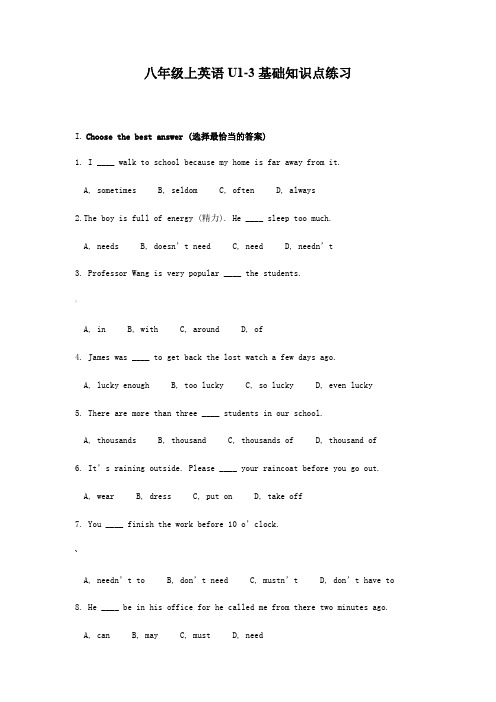
八年级上英语U1-3基础知识点练习I.Choose the best answer (选择最恰当的答案)1. I ____ walk to school because my home is far away from it.A, sometimes B, seldom C, often D, always2.The boy is full of energy (精力). He ____ sleep too much.A, needs B, doesn’t need C, need D, needn’t3. Professor Wang is very popular ____ the students.>A, in B, with C, around D, of4. James was ____ to get back the lost watch a few days ago.A, lucky enough B, too lucky C, so lucky D, even lucky5. There are more than three ____ students in our school.A, thousands B, thousand C, thousands of D, thousand of6. It’s raining outside. Please ____ your raincoat before you go out.A, wear B, dress C, put on D, take off7. You ____ finish the work before 10 o’clock.~A, needn’t to B, don’t need C, mustn’t D, don’t have to 8. He ____ be in his office for he called me from there two minutes ago. A, can B, may C, must D, need9. I’m sorry that I can’t ____ the lecture at the City Hall.A, attend B, take part in C, join D, enter10. Oh, what a ____ film! I really get ____.A, boring, boring B, boring, bored C, bored, boring D, bored, bored(11. Maggie is very afraid ______ dogs.A. atB. withC. ofD. in12. ______ happy life we are living now!A. What aB. How aC. WhatD. How13. Please be careful when you walk ______ the street.A. acrossB. throughC. crossD. past14. About ______ people took part in the spots meeting.A. hundreds ofB. three hundredsC. three hundredD. three hundreds of15. How long _______ the celebrations for Mid-autumn Festival _______?A. did…lastedB. does…lastC. do…lastsD. do…last16. He ______ his coat and went out.A. woreB. was wearingC. puts onD. put onplete the following passage with the words in the box. Each word can only be used once(将下列单词填入空格,每空格限填一词,每个单词只能填一次)¥Mr. Charles Buffington is an Englishman. He lives in the UK, but he 1 many different places. His first name is Charles, and his family name is Buffington. Buffington is the name 2 a very old city, Mr. Charles Buffington teaches and goes to different places. He speaks English, and he can speak some other languages. He can speak Chinese and French very 3 . When he goes to Australia, Japan, America, France and Canada, many people want to 4 him because he is so clever.III. Complete the sentences with the given words in their proper forms(用括号中所给单词的适当形式完成下列句子)1.The man went to the barber's ________ a month.(two)2. It's ___________ for her to get A for English because she dislikes it. (usual)3. Let's have a ___________about tomorrow's picnic.(discuss)-4. She was a ___________ business woman. (succeed)5. Who is the football player among the three? (good)6. Joan is as tall as her sister, they’re the same __________. (high)7.That sounds great. You have Beckham’s___________ (sign)8. __________ was my favourite subject when I was in the secondary school. (physical)IV. Rewrite the following sentences as required(根据所给要求,改写下列句子,每空格限填一词)1. She has some tasty food for dinner every day. (改为否定句)`She _________ __________ any tasty food for dinner every day.2. Tim seldom goes to school late. (改为反意疑问句)Tim seldom goes to school late, ?3. I paid only 10 yuan for this nice sweater. (对划线提问)_________ __________ did you pay for this nice sweater?4. The boy with short, blonde hair has got his own blog. (就划线部分提问)______ _______ has got his own blog?5. Mr. Green was too poor to send his children to school. (保持原句意思)#Mr. Green wasn’t ________ ________ to send his children to school.参考答案I.1-5 BDBAB 6-10 CDCAB 11-16 CAACBDII. CBEAIII. twice unusual discussion successful best height signature physics I V. doesn’t have ; does he ; How much ;Which boy ;rich enough。
Unit1-Unit3基础题巩固练习之词汇运用 牛津译林版英语八年级上册

8AU1-U3基础题巩固练习之词汇运用A.请根据句意、首字母、英文释义和中文提示,写出句中所缺单词使句子通顺。
1. Betty is ________(耐心的)enough to listen to her classmates’ problems. All her classmates like her very much.2. Be quiet! They are ________(talk about) the activities to welcome the new students.3. Jiao Jian, as a new CEO of MMG, will _________ (go to) this important meeting.4. China is a powerful country. It _______(give something to someone willingly) a lot to the world.5. Life is always up and down. It’s a wave, not a _________line.B.请根据句意从方框中选择合适的单词,并用其适当形式填空,使句子通顺。
they France far high use6. All the players have known the rule so there is no need for any________instructions.7. If you keep practising speaking __________, you’ll be better at it.8. Millie, your bedroom looks terrible. Why not throw something________ away?9. The twins have lost _________in computer games for a long time. It’s time for them to change that bad habit.10. He is 185cm tall. His _________makes him stand out in the crowd.plan arrive not trust win advise11. Two women _________this year’s Nobel Prize in Chemistry. They hope girls and young women scientists will understand that nothing is impossible.12. —I heard you and a man talking when I went past your yard.— Yes, he is my painter, Lord. He _________me to change the colour of the fence when you passed by.13. —Where is Tommy?—He together with his father________the picnic next Sunday in the living room.14. John is a creative boy and a new idea _________in his brain from time to time.15. Remember to return the things you have borrowed on time , or they ________ you.B.请根据句意、首字母、英文释义和中文提示,写出句中所缺单词使句子通顺。
牛津版沪教版英语八年级(上)Unit-1-Encyclopaedias-词句讲解+练习+答案
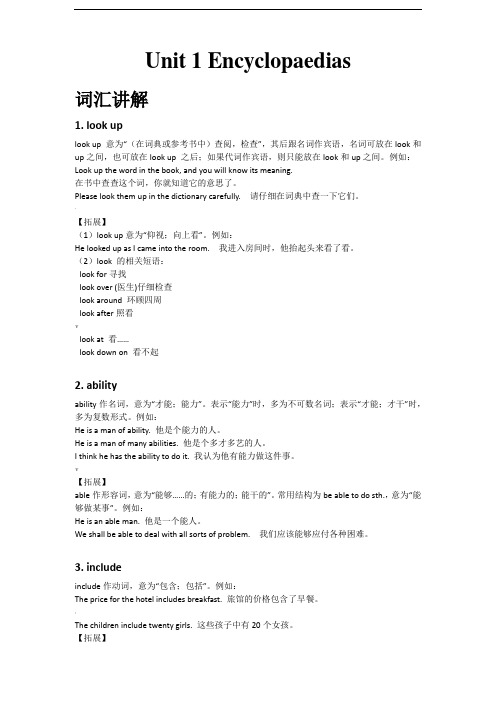
Unit 1 Encyclopaedias词汇讲解1. look uplook up 意为“(在词典或参考书中)查阅,检查”,其后跟名词作宾语,名词可放在look和up之间,也可放在look up 之后;如果代词作宾语,则只能放在look和up之间。
例如:Look up the word in the book, and you will know its meaning.在书中查查这个词,你就知道它的意思了。
Please look them up in the dictionary carefully. 请仔细在词典中查一下它们。
`【拓展】(1)look up意为“仰视;向上看”。
例如:He looked up as I came into the room. 我进入房间时,他抬起头来看了看。
(2)look 的相关短语:look for寻找look over (医生)仔细检查look around 环顾四周look after照看¥look at 看……look down on 看不起2. abilityability作名词,意为“才能;能力”。
表示“能力”时,多为不可数名词;表示“才能;才干”时,多为复数形式。
例如:He is a man of ability. 他是个能力的人。
He is a man of many abilities. 他是个多才多艺的人。
I think he has the ability to do it. 我认为他有能力做这件事。
¥【拓展】able作形容词,意为“能够……的;有能力的;能干的”。
常用结构为be able to do sth.,意为“能够做某事”。
例如:He is an able man. 他是一个能人。
We shall be able to deal with all sorts of problem. 我们应该能够应付各种困难。
3. includeinclude作动词,意为“包含;包括”。
沪教牛津版-英语-八上-八年级上新英语 Unit 1-3 知识归纳
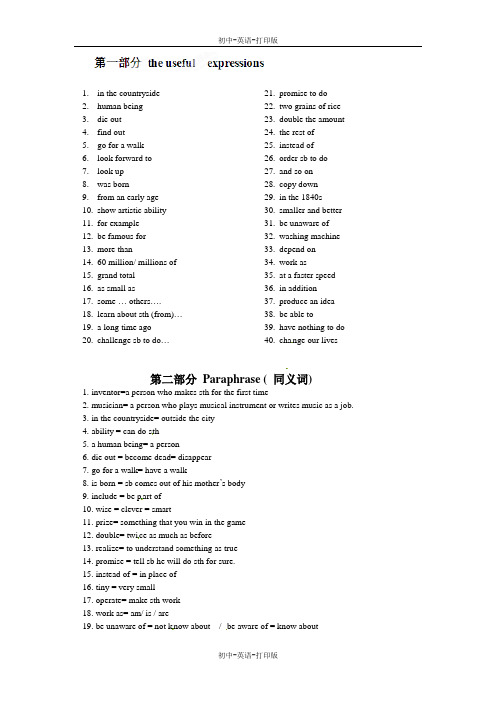
1.in the countryside2.human being3.die out4.find out5.go for a walk6.look forward to7.look up8.was born9.from an early age10.show artistic ability11.for example12.be famous for13.more than14.60 million/ millions of15.grand total16.as small as17.some … others….18.learn about sth (from)…19.a long time ago20.challenge sb to do …21.promise to do22.two grains of rice23.double the amount24.the rest of25.instead of26.order sb to do27.and so on28.copy down29.in the 1840s30.smaller and better31.be unaware of32.washing machine33.depend on34.work as35.at a faster speed36.in addition37.produce an idea38.be able to39.have nothing to do40.cha nge our lives----------------------------------------------------------------------------------------------- 第二部分Paraphrase ( 同义词)1.inventor=a person who makes sth for the first time2.musician= a person who plays musical instrument or writes music as a job.3.in the countryside= outside the city4.ability = can do sth5.a human being= a person6.die out = become dead= disappear7.go for a walk= have a walk8.is born = sb comes out of his mother’s body9.include = be p art of10.wise = clever = smart11.prize= something that you win in the game12.double= twi ce as much as before13.realize= to understand something as true14.promise = tell sb he will do sth for sure.15.instead of = in place of16.tiny = very small17.operate= make sth work18.work as= am/ is / are19.be unaware of = not k now about / be aware of = know about20.depend on = need help from sb21.in addition= and… as well = besides = what’s more22.look forward to doing = expect to do23.monitor =It is a part of computer and shows pictures and words24.mouse= we m ove it to control the computer.25.do sth with..= use sth to do..第三部分单词变形1.Italy —Italian2.invent —invention—inventor3.music—musical—musician4.science—scientist5.art—artist6.able—ability7.sudden—suddenly8.include—including9.win—winner10.India—Indian 11.correct—correc tly12.speak—speaker13.aware—unaware14.challenge sb to do15.order sb to do16.paint—painter17.promise to do18.would like to to19.like doing20.instead of doing第四部分语法Grammar一. 形容词和副词的比较级和最高级规律§下列情况用比较级1. than, much, even, a little , a bit , next time 比较级2. the 比较级…, the 比较级…. (越是。
沪教牛津版初二上册英语知识点总结全册含习题和答案
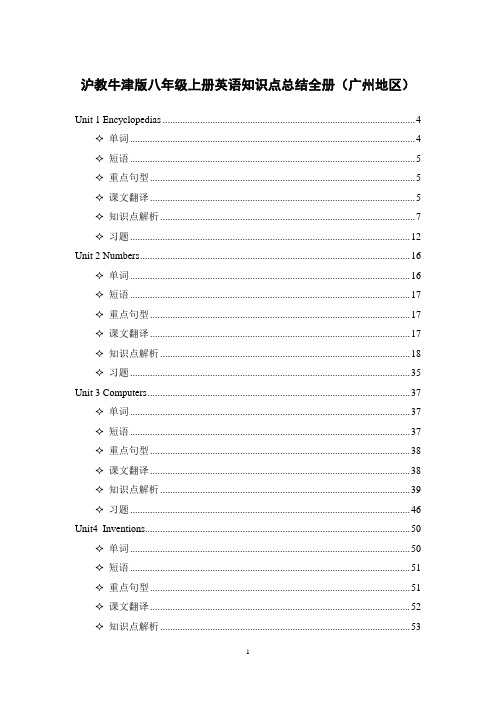
沪教牛津版八年级上册英语知识点总结全册(广州地区)Unit 1 Encyclopedias (4)✧ 单词 (4)✧ 短语 (5)✧ 重点句型 (5)✧ 课文翻译 (5)✧ 知识点解析 (7)✧ 习题 (12)Unit 2 Numbers (16)✧ 单词 (16)✧ 短语 (17)✧ 重点句型 (17)✧ 课文翻译 (17)✧ 知识点解析 (18)✧ 习题 (35)Unit 3 Computers (37)✧ 单词 (37)✧ 短语 (37)✧ 重点句型 (38)✧ 课文翻译 (38)✧ 知识点解析 (39)✧ 习题 (46)Unit4 Inventions (50)✧ 单词 (50)✧ 短语 (51)✧ 重点句型 (51)✧ 课文翻译 (52)✧ 知识点解析 (53)✧ 习题 (56)Unit5 Educational exchange (59)✧ 单词 (59)✧ 短语 (59)✧ 重点句型 (60)✧ 课文翻译 (61)✧ 知识点解析 (62)✧ 习题 (70)Unit 6 Ancient stories (73)✧ 单词 (73)✧ 短语 (74)✧ 重点句型 (74)✧ 课文翻译 (75)✧ 知识点解析 (76)✧ 习题 (81)Unit 7 Memory (86)✧ 单词 (86)✧ 短语 (87)✧ 重点句型 (88)✧ 课文翻译 (88)✧ 知识点解析 (89)✧ 习题 (96)Unit 8 English Week (100)✧ 单词 (100)✧ 短语 (101)✧ 重点句型 (101)✧ 课文翻译 (101)✧ 知识点解析 (103)✧ 习题 (107)每单元必考语法点预览Unit 1 some与any的用法& 复合不定代词somebody, anybody, nobody等的用法Unit 2基数词及数字的表达& 序数词Unit 3形容词的比较级与最高级Unit 4 good, bad, far & (not) as…as…Unit 5现在完成时& already, yet, ever, neverUnit 6 现在完成时中since, for & 现在完成时与一般过去时的区别Unit 7(真实性)条件状语从句& if…not 与unlessUnit 8情态动词should, had betterUnit 1 Encyclopedias 单词✧短语1.in the countryside 在乡村,在农村11.for example 例如2.human being 人12.next to 紧挨着3.die out 灭绝,消失13.look up 查阅4.find out 了解,弄清14.live on Earth 生活在地球上5.go for a walk 去散步15.an Italian painter 一位意大利画家6.be born 出生ed to do sth 过去常常做某事7.more than 多于,超过17.at the end of 在…末尾8.just like 正如,正像18.in the centre 在中心9.how long 多久e out of…从…出来10.would like 想要20.be famous for 以…而闻名✧重点句型1.Some dinosaurs were as small as chickens. 有的恐龙和鸡一样小。
牛津版英语八年级上册unit1专项知识点整理与练习(无答案)

牛津版英语八年级上册Unit 1 Encyclopaedias 学案(三)Language边学边做TaskⅠ目标展示。
选词填空。
some / any1. I have _______ fruit with me. Would you like to taste it?2. —Do you have _______ new toy cars?—Sorry, I don’t have _______.3. —What about _______ milk?—That sounds great.somebody / anybody / nobody4. —Did ______ see you break the window?—No, I don’t think so. ______ saw me.—Look! ______ is coming this way.—Oh, that’s Miss Gao. I must say sorry to her.something / anything / nothing5. —Would you like ______ to eat?—No, thanks. I don’t want _______ at the moment.—But you’ve had ________ to eat all day. Is there ______ wrong with you? Are you feeling ill?—No. Don’t worry. Everything is fine. I’m just not hungry. That’s all.Task II 语法突破。
some &anysome 和any 皆意为“一些”,既可修饰可数名词,又可修饰不可数名词。
例如:There are some books on the desk. 桌子上有一些书。
I want some apple juice. 我想来点苹果汁。
上海牛津版八年级上Unit1知识点总结
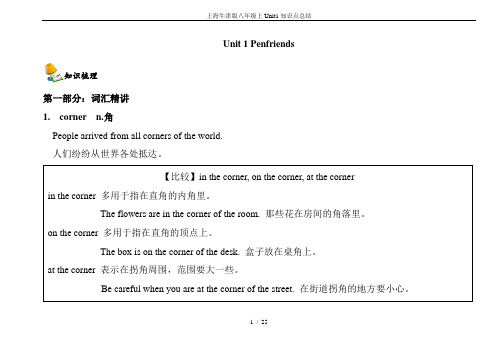
Unit 1 Penfriends知识梳理第一部分:词汇精讲1. corner n.角People arrived from all corners of the world.人们纷纷从世界各处抵达。
【比较】in the corner, on the corner, at the cornerin the corner 多用于指在直角的内角里。
The flowers are in the corner of the room. 那些花在房间的角落里。
on the corner 多用于指在直角的顶点上。
The box is on the corner of the desk. 盒子放在桌角上。
at the corner 表示在拐角周围,范围要大一些。
Be careful when you are at the corner of the street. 在街道拐角的地方要小心。
1 / 252. own v.拥有Mr. Smith owns a car.史密斯先生有一辆小汽车。
【拓展】own adj.自己的;特有的owner n.物主人3. nearby adv.在附近She lives nearby.她住在附近。
【拓展】nearby还可以作为形容词和介词。
(1)作形容词时,意为“附近的;旁边的”。
如:She is staying at a nearby hotel. 她住在附近一家旅馆里。
(2)作介词时,意为“在……旁边;在……附近”,相当于near。
如:We’re going to build a new hotel nearby the station。
我们打算在车站附近新建一座旅馆。
4. university n.大学;高等学府Did your brother go to university?你哥哥上过大学吗?【拓展】college与university2 / 25College指规模较小,学科较少的高等院校,尤指与特定职业相关的高等教育机构,如:师范学院,技术学院等;它也可指university中划分出来的各个学院,如:文学院、计算机学院等。
(完整word版)牛津上海版英语八上各单元知识点
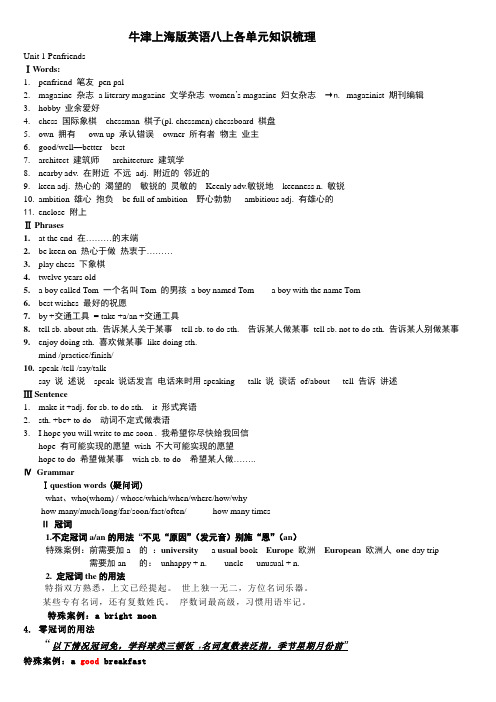
牛津上海版英语八上各单元知识梳理Unit 1 PenfriendsⅠWords:1.penfriend 笔友pen pal2.magazine 杂志a literary magazine 文学杂志women’s magazine 妇女杂志→n. magazinist 期刊编辑3.hobby 业余爱好4.chess 国际象棋chessman 棋子(pl. chessmen) chessboard 棋盘5.own 拥有own up 承认错误owner 所有者物主业主6.good/well—better---best7.architect 建筑师architecture 建筑学8.nearby adv. 在附近不远adj. 附近的邻近的9.keen adj. 热心的渴望的敏锐的灵敏的Keenly adv.敏锐地keenness n. 敏锐10.ambition 雄心抱负be full of ambition 野心勃勃ambitious adj. 有雄心的11.enclose 附上Ⅱ Phrases1.at the end 在………的末端2.be keen on 热心于做热衷于………3.play chess 下象棋4.twelve years old5. a boy called Tom 一个名叫Tom 的男孩a boy named Tom a boy with the name Tom6.best wishes 最好的祝愿7.by +交通工具= take +a/an +交通工具8.tell sb. about sth. 告诉某人关于某事tell sb. to do sth. 告诉某人做某事tell sb. not to do sth. 告诉某人别做某事9.enjoy doing sth. 喜欢做某事like doing sth.mind /practice/finish/10.speak /tell /say/talksay 说述说speak 说话发言电话来时用speaking talk 说谈话of/about tell 告诉讲述Ⅲ Sentence1.make it +adj. for sb. to do sth. it 形式宾语2.sth. +be+ to do 动词不定式做表语3.I hope you will write to me soon . 我希望你尽快给我回信hope 有可能实现的愿望wish 不大可能实现的愿望hope to do 希望做某事wish sb. to do 希望某人做……..ⅣGrammarⅠquestion words (疑问词)what、who(whom) / whose/which/when/where/how/whyhow many/much/long/far/soon/fast/often/ how many timesⅡ冠词1.不定冠词a/an的用法“不见“原因”(发元音)别施“恩”(an)特殊案例:前需要加a 的:university a usual book Europe 欧洲European欧洲人one-day trip 需要加an 的:unhappy + n. uncle unusual + n.2. 定冠词the的用法特指双方熟悉,上文已经提起。
牛津版沪教版英语八年级(上)Unit 1 Encyclopaedias 语法讲解+练习+答案

语法讲解:some、any、复合不定代词一、some 和any1.some和any既可以修饰可数名词又可以修饰不可数名词,some常用在肯定句中,而any 则常用在否定句和疑问句中,如:(1) --- I have some tea here. 我这儿有些茶叶。
(2) --- I can't see any tea. 我没看见茶叶。
(3) Do you have any friends at school? 你在学校有朋友吗?2.Some也可以用在疑问句中,表示希望得到肯定的回答,如。
Would you like some cold water to drink? 你想要喝一些冷水吗?二、复合不定代词复合不定代词由some, any, no加body, thing 或one 构成,用来指代不特定的人或物。
具体来说:(1) 复合不定代词someone/somebody表示“某人”,something表示“某物”,它们常用于肯定句中。
也可以用在疑问句中,表示希望得到肯定的回答。
如:There is somebody/someone in the room. 房间里有人。
Would you like something to eat? 你想吃点什么吗?(2) 复合不定代词anyone/anybody表示“某人;任何人”,anything表示“某物;任何事物”,它们常用于否定句或疑问句中。
如:There isn’t anything in the house. 屋子里没有任何东西。
Did you see anyone/anybody there? 你在那儿看到什么人了吗?(3) 复合不定代词no one/nobody表示“没有人”,相当于not anyone/anybody ,nothing 表示“没什么东西”,相当于not anything 。
如:I saw nobody there. 我在那儿谁也没看到。
牛津沪教版英语八年级上Unit 1 Lesson 1-2词性复习及代词

解析:本题结合宾语从句考察,需要注意宾语从句的三大点,首先应注意陈述句语序,其次应注意时态并选好引导词,本题原句问句为一般疑问句,改为宾语从句时用if/ whether引导,故本题答案为if/whether,stayed。
三、专题过关Rewrite the following sentences as required(根据所给要求,改写下列句子。
每空格限填一词)1.The students have many exercises to do every day. (改为否定句)The students _________ _________ many exercises to do every day.2.They tried everything they could to improve the situation. (改为反意疑问句)They tried everything they could to improve the situation, _________ _________?3.We must train them to think independently. (改为被动语态)They must _________ _________ to think independently.4. Ben Rogers came along the road, singing happily and carrying an apple. (对划线部分提问)_________ _________ Ben Rogers come along the road?5. I didn’t make a phone call. I sent an e-mail. (保持句意基本不变)I sent an e-mail _________ _________ making a phone call.6. The music at the cafe sounded so noisy that I couldn’t stay any longer. (改为简单句)The music at the cafe sounded _________ _________ for me to stay any longer.7.Eddie couldn’t remember. What happened after the accident? (合并为一句)Eddie couldn’t remember _________ _________ happened after the accident.8.She always sits in the corner of the room. (改为一般疑问句)__________ she always __________ in the corner of the room?9. The competition is held every four years. (对划线部分提问)__________ __________ is the competition held?10. She has never been abroad. (改为反意疑问句)She has never been abroad, __________ __________?11. A driver took the boy the hospital yesterday. (改为被动语态)The boy __________ __________ to the hospital by a driver yesterday..12. You can come with us. You can also stay at home with your mother. (合并为一句)You can __________ come with us __________ stay at home with your mother.13. “I can help repair the bike.” said Jerry. (改为宾语从句)Jerry said __________ he __________ help repair the bike.14. She arrived early in order to get a good seat. (保持句意基本不变)She arrived early __________ __________ she could get a good seat.15. Jake has already downloaded many free games from the App store. (改为否定句)Jake ________ downloaded many free games from the App store ________.16. Disneyland is such an amazing amusement park. (改为感叹句)________ ________ the amusement park Disneyland is!17. Some people like to drink strong coffee to stay awake late at night. (保持句意基本不变)Some people like to drink strong coffee ________ ________ they can stay awake late at night.18. A mouse ate half of the cake I left on the table. (改为被动语态)Half of the cake I left on the table ________ ________ by a mouse.19. Learning a foreign language can help the students understand different cultures.(对划线部分提问)________ ________ learning a foreign language help the students understand?20. Jane has improved a lot on her painting skills since she went to France. (保持句意基本不变)Jane has ________ ________ in her painting skills since she went to France.Keys:1-5 don’t have didn’t they be trained How did instead of能力3:主动句变被动语态常考的考点:一般现在时、一般过去时、以及含有情态动词的被动语态如:The terrible earthquake destroyed thousands of houses in that area. (08年中考题)Thousands of houses in that area ___________ ___________ by the terrible earthquake.解析:原句为过去时,则改为被动语态时态应一致,被动语态中的主语thousands of houses为复数,故本题答案为were destroyed。
牛津上海版八年级上英语Unit1-4知识点练习
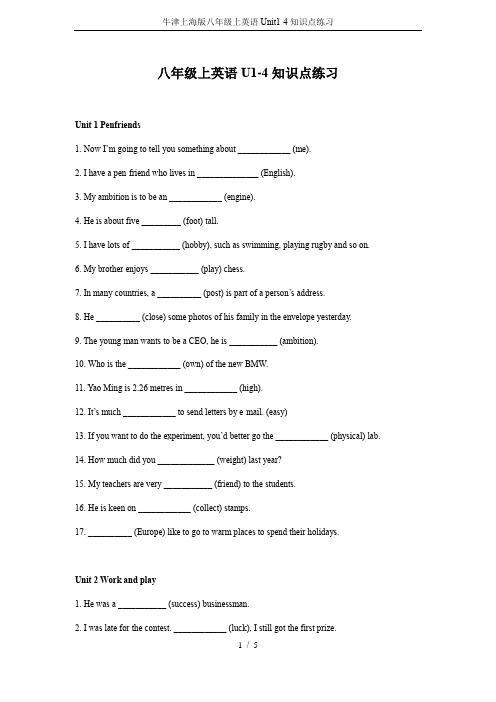
八年级上英语U1-4知识点练习Unit 1 Penfriends1. Now I’m going to tell you something about ____________ (me).2. I have a pen-friend who lives in ______________ (English).3. My ambition is to be an ____________ (engine).4. He is about five _________ (foot) tall.5. I have lots of ___________ (hobby), such as swimming, playing rugby and so on.6. My brother enjoys ___________ (play) chess.7. In many countries, a __________ (post) is part of a person’s address.8. He __________ (close) some photos of his family in the envelope yesterday.9. The young man wants to be a CEO, he is ___________ (ambition).10. Who is the ____________ (own) of the new BMW.11. Yao Ming is 2.26 metres in ____________ (high).12. It’s much ____________ to send letters by e-mail. (easy)13. If you want to do the experiment, you’d better go the ____________ (physical) lab.14. How much did you _____________ (weight) last year?15. My teachers are very ___________ (friend) to the students.16. He is keen on ____________ (collect) stamps.17. __________ (Europe) like to go to warm places to spend their holidays.Unit 2 Work and play1. He was a ___________ (success) businessman.2. I was late for the contest. ____________ (luck), I still got the first prize.3. My uncle is the ____________ (manage) of the __________ (sell) department.4. Her mother used to be a shop ____________ (assist).5. I hate having English lessons. They are too _________ (bore).6. We brush our _________(tooth) ___________ (two) a day.7. They will have a ____________ (discuss) in the class meeting.8. My father works as a(n)______________ (account) in a big company.9. The man is discussing the ____________ (busy) with a client.10. Good children always tell the ____________ (true).11. I have _____________ (sell) the old house.12. Every morning, Ben goes _______________ (jog) before he goes to school.13. The students continued ____________ (draw) the map after a short break.14. A child needs 10 hours’ ____________ (sleep).15. Look at the _____________ (sleep) child. He watched too much television last night. You know he often falls _____________ in class. (sleep)16. The whiz-kid often _____________ A grades in all his subjects. (achievement)17. The boy ___________ to pass the maths test last week because he seldom does his homework. (fail).Unit 3 Trouble!1.When I passed by the mall I, I heard a big _________ (argue).2.Two foreign men _________ died in the accident last week. (tour)3.The supermarket is always __________ with people on weekends. (crowd)4.The purse was __________ three minutes ago. (steal)5.When Tom heard the news, he left __________ (hurry)6._______ he saw his class teacher at the corner of the street. (sudden)7.Don’t speak to a ________ when you are walking on the street (strange)8.“How do you get such good marks in all subjects?” he asked ___________ (strange)9.He always _________ other students with their homework. (assistant)10.The old man happened to see a thief in his neighborhood, he _____110 immediately (dial)11.Put the ___________ sentences into English. (follow)12.My ambition is to be a _________ in the future (report)13.There were several bank ________ in the city. (rob)14.You mustn’t take away his MP3 without his ____________ (permit)15.Can you give me some more ___________ about robbery? (tail)16.That’s a good __________, we will take it. (think)17.It’s _______ for him to get A in English, because he isn’t good at it. (usually)Unit 4 Numbers1. Our brain is a _______ (live) computer, and it is the most important part of our body.2. Can you do that ________ (calculate) by yourself?3. Who first __________ (invention) the system of numbers from 1 to 9?4. China is still a ___________ (develop) country. We Chinese people must work harder to makeour motherland richer and stronger.5. The motorbike began to move at an ______ (amaze) speed.6. It’s popular to send and receive _________ (electric) mail.7. Can you see the __________ calculator on the desk? (electricity)8. His car had a ___________ engine. (power)9. With the __________ of our country, our life is getting better and better. (develop)10. Human brains are just like ____________ computers. (live)11. Do you know the ____________ to the problem? (solve)12. Edison is one of the most famous ____________ in the world. (invent)参考答案Unit 1 Penfriends1. myself2. England3. engineer4. feet5. hobbies6. playing7. postcode8. enclosed9. ambitious 10. owner 11. height 12. easier 13. physics 14. weigh 15. friendly 16. collecting 17. EuropeansUnit 2 Work and play1. successful2. Luckily3. manager4. assistant5. boring6. teeth, twice7. discussion8. accountant9. business 10. truth 11. sold 12. jogging 13. to draw 14. sleep 15. sleeping, asleep 16. achieves 17. failedUnit 3 Trouble!1. argument2. tourists3. crowded4. stolen5. hurriedly6. Suddenly7. stranger8. strangely9. assists 10. dialed 11. following 12. reporter 13. robberies 14. permission 15. details 16. thought 17. unusualUnit 4 Numbers1, living 2, calculation 3, invented 4, developing 5,amazing 6, electronic7. electronic 8. powerful 9. development 10. living 11. solution 12. inventors。
牛津上海版八年级上册英语 Unit3 基础练习

八年级上英语U3基础练习I. Choose the best answer. (选择最恰当的答案)( ) 1. Don’t shout __________ the old man, it’s impolite.A. atB. withC. ofD. for( ) 2. He __________ his friend’s phone number for many times, but the line was always busy.A. calledB. phonedC. dialledD. rang( ) 3. He told me a real story which happened __________ him.A. forB. toC. inD. of( ) 4. The man __________ a vase when the police caught him.A. stealB. stoleC. is stealingD. was stealing( ) 5. The two policemen followed the thief when he was trying to escape. The underlined part means __________.A. went offB. went onC. went withD. went after( ) 6. The little girl is afraid __________ thunder and lightning.A. ofB. withC. forD. to( ) 7. When the ferry started, the young woman hurried __________.A. aboardB. abroadC. to aboardD. to abroad( ) 8. People __________ the boy who was crying.A. lookedB. watchedC. stared atD. saw( ) 9. She __________ the pen on the ground and gave it to me.A. pickedB. picked upC. picksD. picks up( ) 10. He kept a __________ every day when he was a child.A. diaryB. dairyC. dailyD. day( ) 11. She is __________ who enjoys playing basketball.A. one of the woman teacherB. one of the woman teachersC. one of the women teacherD. one of the women teachers( ) 12. The film star moved through the __________ and got into the car.A. crowdedB. crowdC. crowdsD. crowding( ) 13. Tom __________ someone singing in the next room a moment ago.A. hearB. hearsC. heardD.hearing( ) 14. It was raining heavily __________ we arrived at the campsite.A. thatB. whatC. asD. how( )15. The policeman came and asked the boy what was happening. The underlined part means __________.A. what will going onB. what was going onC. what will happeningD. what has happened( ) 16. --- Dad, I’ve got an A in English. --- __________.A.Well done.B. All right.C. OK.D. You’re welcome.II. Complete the sentences with the given words in their proper forms. (用所给单词的适当形式填空)1. We had an _______________ about politics. (argue)2. I saw two _______________ stealing a woman’s purse. (thief)3. Please keep ______________ (quietly), the baby is sleeping.4. Nanjing Road is so ____________ during the Chinese New Year. (crowd)5. Three ______________ tourists come from America. (woman)6. It’s too late for school, we had to leave _____________. (hurry)7. In the _____________ years, he worked hard and became a doctor.(follow)8. I don’t want to be a ______________. I think it’s a dangerous job. (report)9. When I got into the classroom, Peter and Jackson were ____________. And many otherstudents didn’t know about their ______________. (argue)10. My parents are always _____________ about my life. (worry)11. He always gets to school early. It was _______________ for him to be late for schoolyesterday. (usually)12. My son _____________ to do more practice to keep healthy.(decision)13. I __________ realized that I didn't bring my key. ( sudden )14. It’s __________ for Jane to be late for school. She usually comes to school on time. ( usual )III. Rewrite the sentences as required. ( 按要求改写句子,每空格限填一词)1. The firemen put out the big fire in a short time. (改为否定句)The firemen __________ __________ out the big fire in a short time.2. The Wangs were having a picnic this time yesterday. (对划线部分提问)__________ were the Wangs __________ this time yesterday?3. We went to Qingdao by train during the summer holiday. (保持句意不变)We __________ __________ train to Qingdao during the summer holiday.4. Let’s make a phone call to Lily first. (改为反意疑问句) Let’s make a phone call to Lily first, __________ __________?5. I have never been to Ningbo by ship. (改为一般疑问句) __________ you __________ been to Ningbo by ship?6. Jack hurried to school without breakfast yesterday. (保持句意不变)Jack went to school in __________ __________without breakfast yesterday.7.I was unhappy last weekend.(改为一般疑问句)________ _________unhappy last weekend?8.Tom was lucky enough to pass the driving test.(保持句意不变)__________, Tom _______the driving test.9.What was going on?(保持句意不变)What _______ ________?10.The officers went to the meeting room in a hurry.(保持句意不变)The officers _______ ________ the meeting room.11.My friend noticed that her purse was gone.(对划线部分提问)________ _______your friend notice?参考答案I.ACBDD AACBA DCCCBAII. argument; thieves; quiet; crowded; women; hurriedly; following; reporter; arguing;argument; worried; unusual; decided; suddenly; unusualIII. didn’t put; What doing; took a; shall we; Have ever; a hurryWere you; Luckily passed; was happening; hurried to; What did。
- 1、下载文档前请自行甄别文档内容的完整性,平台不提供额外的编辑、内容补充、找答案等附加服务。
- 2、"仅部分预览"的文档,不可在线预览部分如存在完整性等问题,可反馈申请退款(可完整预览的文档不适用该条件!)。
- 3、如文档侵犯您的权益,请联系客服反馈,我们会尽快为您处理(人工客服工作时间:9:00-18:30)。
牛津上海版八年级上英语U n i t1-3基础知识
点练习
-CAL-FENGHAI.-(YICAI)-Company One1
八年级上英语U1-3基础知识点练习
I.Choose the best answer (选择最恰当的答案)
1. I ____ walk to school because my home is far away from it.
A, sometimes B, seldom C, often D, always
2.The boy is full of energy (精力). He ____ sleep too much.
A, needs B, doesn’t need C, need D, needn’t
3. Professor Wang is very popular ____ the students.
A, in B, with C, around D, of
4. James was ____ to get back the lost watch a few days ago.
A, lucky enough B, too lucky C, so lucky D, even lucky 5. There are more than three ____ students in our school.
A, thousands B, thousand C, thousands of D, thousand of 6. It’s raining outside. Please ____ your raincoat before you go out. A, wear B, dress C, put on D, take off
7. You ____ finish the work before 10 o’clock.
A, needn’t to B, don’t need C, mustn’t D, don’t have to
8. He ____ be in his office for he called me from there two minutes ago.
A, can B, may C, must D, need
9. I’m sorry that I can’t ____ the lecture at the City Hall.
A, attend B, take part in C, join D, enter
10. Oh, what a ____ film! I really get ____.
A, boring, boring B, boring, bored C, bored, boring D, bored, bored
11. Maggie is very afraid ______ dogs.
A. at
B. with
C. of
D. in
12. ______ happy life we are living now!
A. What a
B. How a
C. What
D. How
13. Please be careful when you walk ______ the street.
A. across
B. through
C. cross
D. past
14. About ______ people took part in the spots meeting.
A. hundreds of
B. three hundreds
C. three hundred
D. three hundreds of
15. How long _______ the celebrations for Mid-autumn Festival _______
A. did…lasted
B. does…last
C. do…lasts
D. do…last
16. He ______ his coat and went out.
A. wore
B. was wearing
C. puts on
D. put on
plete the following passage with the words in the box. Each word can only be used once(将下列单词填入空格,每空格限填一词,每个单词只能填一次)
Mr. Charles Buffington is an Englishman. He lives in the UK, but he 1 many different places. His first name is Charles, and his family name is Buffington. Buffington is the name 2 a very old city, Mr. Charles Buffington teaches and goes to different places. He speaks English, and he can speak some other languages. He can speak Chinese and French very 3 . When he goes to Australia, Japan, America, France and Canada, many people want to 4 him because he is so clever.
III. Complete the sentences with the given words in their proper forms(用括号中所给单词的适当形式完成下列句子)
1.The man went to the barber's ________ a month.(two)
2. It's ___________ for her to get A for English because she dislikes it. (usual)
3. Let's have a ___________about tomorrow's picnic.(discuss)
4. She was a ___________ business woman. (succeed)
5. Who is the football player among the three
(good)
6. Joan is as tall as her sister, they’re the same __________. (high)
7.That sounds great. You have Beckham’s___________ (sign)
8. __________ was my favourite subject when I was in the secondary school.
(physical)
IV. Rewrite the following sentences as required(根据所给要求,改写下列句子,每空格限填一词)
1. She has some tasty food for dinner every day. (改为否定句)
She _________ __________ any tasty food for dinner every day.
2. Tim seldom goes to school late. (改为反意疑问句)
Tim seldom goes to school late,
3. I paid only 10 yuan for this nice sweater. (对划线提问)
_________ __________ did you pay for this nice sweater?
4. The boy with short, blonde hair has got his own blog. (就划线部分提问)
______ _______ has got his own blog?
5. Mr. Green was too poor to send his children to school. (保持原句意思)
Mr. Green wasn’t ________ ________ to send his children to school.
参考答案
I.1-5 BDBAB 6-10 CDCAB 11-16 CAACBD
II. CBEA
III. twice unusual discussion successful best height signature physics
I V. doesn’t have ; does he ; How much ;Which boy ;rich enough。
